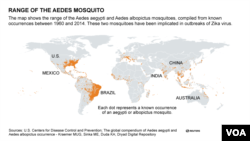The World Health Organization on Thursday advised officials not to accept blood donations from people who had recently returned from countries affected by the Zika virus.
The mosquito-borne virus is most prevalent in Latin America, particularly Brazil, and poses its greatest danger to pregnant women.
"With the risk of incidence of new infections of Zika virus in many countries ... it is estimated as an appropriate precautionary measure to defer donors who return from areas with Zika virus outbreaks," the WHO told the French news agency AFP.
Doctors suspect the Zika virus is linked to a rare neurological condition called microcephaly, which causes babies to be born with abnormally small heads.
Brazil has reported more than 4,000 microcephaly cases since October. But experts are puzzled about why it is nearly nonexistent in other Latin American countries where the Zika virus is present.
Spain confirmed the virus Thursday in a pregnant woman who had recently traveled to Colombia. It was the first known pregnancy-related Zika case in Europe.
The woman was among seven people who showed symptoms of Zika after visiting affected countries, the Health Ministry said, adding that she was under medical treatment in the northeastern region of Catalonia.
Colombia's National Health Institute said last week that the country had recorded 20,297 cases of Zika infection, including 2,116 in pregnant women.
In a statement released January 30, the institute recommended that couples delay pregnancy for six to eight months.
There is currently no treatment for Zika. But a number of global pharmaceutical houses are rapidly working on a vaccine.
In the face of the recent increase in cases, the presidents of the United States and Brazil have agreed on the importance of collaborative efforts to combat the spread of the Zika virus.
Brazil's President Dilma Rousseff said Thursday that the two countries were working together to develop a vaccine for the Zika virus, but warned it might take some time.
Meanwhile, officials in Panama said they were focusing their fight against Zika on the mosquito that carries the virus.
Experts told AFP they were looking at releasing millions of genetically modified male Aedes mosquitoes who would mate with the females and result in offspring that die at the larval stage.
Panama carried out such an experiment near Panama City in 2014, nearly wiping out a town's entire mosquito population.




